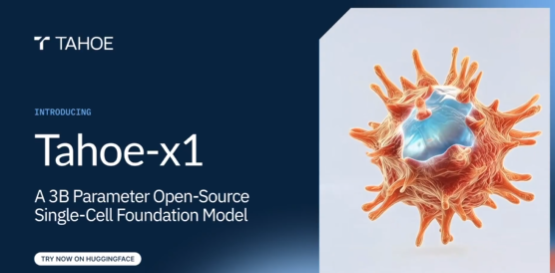Tahoe Bio's AI Model Tx1 Revolutionizes Cancer Research
Tahoe Bio Unveils Breakthrough AI Model for Cancer Research
US life sciences company Tahoe Bio (formerly Vevo Therapeutics) has officially launched Tahoe-x1 (Tx1), a revolutionary 3 billion-parameter AI foundation model designed to decode complex relationships between genes, cells, and drugs. This release marks AI's evolution from a supporting tool to a full-fledged life system modeling engine, opening new pathways for cancer target discovery and personalized therapies.

Architectural Innovation: Built for Single-Cell Analysis
The Tx1 model is based on Transformer encoder architecture and uses masked language modeling (MLM) for pre-training. Its training dataset includes 266 million single-cell transcriptomes, featuring Tahoe Bio's proprietary Tahoe-100M perturbation dataset - recording thousands of molecular perturbations' effects on cancer cell lines, downloaded nearly 200,000 times by researchers globally.
The model family offers multiple size variants (including Tx1-70M) optimized with technologies like FlashAttention v2, achieving 3-30x higher computational efficiency than comparable cellular models. This allows operation on standard GPUs, significantly lowering research barriers.
Three Transformative Capabilities
1. Precision Identification of Cancer Drivers
In gene essentiality prediction tests using the DepMap dataset, Tx1 outperformed all existing models at identifying core driver genes maintaining tumor survival across cancer subtypes. This capability accelerates high-value target identification, particularly benefiting research into heterogeneous and treatment-resistant cancers.
2. Automated Carcinogenic Pathway Reconstruction
The model excels at detecting synergistically activated signal pathways during carcinogenesis. When tested against the MSigDB database, Tx1 achieved record accuracy reconstructing carcinogenic hallmark programs, automatically analyzing critical biological processes like uncontrolled cell cycles and DNA repair defects.
3. Zero-shot Drug Efficacy Prediction
Tx1's most groundbreaking feature is its zero-shot generalization - predicting responses to specific drugs even for previously unseen cell types or patient samples through analogical reasoning. This enables virtual screening of thousands of treatment combinations before laboratory testing begins.
The model also incorporates a post-training framework adapting to diverse patient backgrounds, accelerating personalized therapy development.
Industry Impact and Future Potential
Tahoe Bio ($42M raised) is building the world's largest single-cell perturbation map targeting 1 billion data points. The company has open-sourced Tx1's weights (Hugging Face), code (GitHub), and provided interactive demos alongside a bioRxiv preprint.
The breakthrough represents AI's shift from statistical correlation to mechanistic understanding - thinking like biologists about gene regulation, drug intervention, and cellular response. As data scales expand, Tx1 may become precision medicine infrastructure - simulating millions of treatments virtually to identify optimal real-world therapies.
Key Points:
- Tx1 processes 266M single-cell transcriptomes with unprecedented efficiency
- Outperforms existing models in identifying cancer driver genes
- Automatically reconstructs carcinogenic pathways with record accuracy
- Enables zero-shot prediction of drug responses
- Open-source approach accelerates scientific collaboration